|
Proposals due 18th January 2016. Unexpected Encounters with Deep Time: Violence Read more over at the Edinburgh Environmental Humanities site.
I'm pleased to announce a second event in the Temporal Design series that we’ve been developing here in Edinburgh. This will be a small workshop format, but all welcome. Further information and the link to register is below. Temporal Design: Surfacing Everyday Tactics of TimeThe second in the series of Temporal Design events hosted by Design Informatics (ECA) will focus on the tactics used to negotiate time in everyday life. We are particularly interested in asking how design might support or hinder what we are calling ‘vernacular temporalities’. That is, the idiosyncratic modes of dealing with and understanding time that are locally constructed in response to specific contexts and which may not fit the more regulatory infrastructures that dominate thinking about time.
Vernacular temporalities are those that are produced through day-to-day negotiation with the people, places, objects we encounter. They involve practices that shape how we perceive and manage time. We act and react, we organise and negotiate, stretch and compact time, but we also predict, reminisce, and fantasise about other times. Although these practices play an important role in shaping temporality, they are often enacted in an unreflective way, rarely noted or discussed. Indeed in our first workshop, many participants suggested that it had been the first time they had even articulated the daily practices they had developed to deal with temporal demands. The aim of this workshop, then, is to surface the role of these temporal practices and their effect on broader social contexts, discussing how artefacts and systems may work as triggers, projections, facilitators or obstructions to these practices. The workshop will feature four speakers from design and design theory, whose work touches on different aspects of temporality. They will each highlight a specific artefact, and there will be the opportunities for attendees to participate in reflecting on these talks and/or selected objects throughout the event. The workshop is free and open to all disciplines. When: 28th September 2015, 11am - 4pm Where: Talbot Rice Gallery, The University of Edinburgh, Old College, South Bridge, Edinburgh, EH8 9YL To register for the workshop go to: www.eventbrite.com/e/temporal-design-workshop-tickets-17918054383 For more information contact: [email protected] Organised by Larissa Pschetz, Jane Macdonald, Chris Speed and Michelle Bastian, Design Informatics, University of Edinburgh. 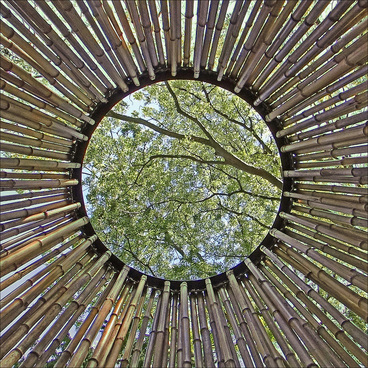 Participation chinoise au pavillon de la Finlande Jean-Pierre Dalbéra (CC BY 2.0) Participation chinoise au pavillon de la Finlande Jean-Pierre Dalbéra (CC BY 2.0) 16th June 2015 12:00 – 17:00 Andrew Grant lecture Theatre, 2.13 Evolution House, West Port, Edinburgh The final event in a series of workshops run by the Edinburgh Environmental Humanities Network and sponsored by IAD and ECA. The interdisciplinary nature of the Environmental Humanities calls for multiple kinds of collaboration, including teams from multiple research areas, researchers working with practitioners and humans working with non-humans. At the same time, however, the research area has arisen within a context where 'collaboration' is often experienced as an imperative imposed by funders, universities and governments. In this workshop then we will seek to explore the fraught nature of collaboration and what benefits or drawbacks it might have for those engaged in environmental research from an arts and humanities perspective. The event will include a series of reflections from collaborative pairs who will explore the why, how and how well, of their various projects. Contributors include:
In the spirit of the workshop we'll start with a potluck lunch before moving into the discussions. So please bring a dish to share. To book a place please email [email protected] The Edinburgh Time Network was set up following last year's Temporal Design workshop and aims to bring together researchers from across Edinburgh who are working on issues to do with time. We periodically host meetings that explore how time is being looked at in particular schools or disciplines, and this Friday we will be visiting the School of Science, Technology and Innovation Studies. If you'd like to join our mailing list, just send me an email.
Thanks to Miguel Garcia-Sancho for organising the event and Larissa Pschetz for the poster design. This Wednesday the Edinburgh Environmental Humanities Network will be hosting our next event in a series looking at how core research practices might be reshaped from an EH perspective. Following on from Teaching and Writing we will now be looking at Creating. The events is free and everyone welcome. Creating in the Environmental Humanities2 - 5pm, Thursday 14 May 2015 Lecture Theatre O17, Hunter Building Edinburgh College of Art, Lauriston Place, EH3 9DF Twitter Feed: #CitEH Presenters:
Hollis Taylor (violinist/composer, zoömusicologist, University of Technology, Sydney) Creativity, originality, genius: Lessons from zoömusicology How and when does music become possible? Is it a matter of biology, or culture, or an interaction between the two? In this talk (with accompanying video and audio), I challenge the notion that because birdsong serves evolutionary functions, it cannot have aesthetic value and be profitably studied by musicologists. My fieldwork focuses on the song, dance, and art of three species of Australian songbird: the pied butcherbird, the lyrebird, and the bowerbird. While much arts discourse leads us in the direction of creativity, originality, and transcendent genius (and the prestige accorded them), avian aesthetics remind us of the significance of mimicry, borrowing, repetition, and recombinatoriality to the creative process. Jo Mango (singer-songwriter, lecturer, University of the West of Scotland) The Black Sun, The Moth and The Moon: songs in search of a 'domain common to both language and being' This performative talk will explore practice--‐based research centred around two original songs: The Black Sun, which explores possibilities of what Foucault called 'the domain common to both language and being' via meditations on Starling murmurations; and The Moth and the Moon, which attempts to enliven Deleuze and Guattari's notions of 'becoming-other' (the universe singing the bird) with the weaving together of images and sounds associated with embodied knowledge. Rob St. John (artist--‐composer, researcher, University of Glasgow) Sounding the anthropocene: the sonic geographies of complexity, uncertainty and disintegration This talk will discuss the potential of the creative use of environmental sound (particularly birdsong) as a form of experimental geography, where spaces, places and landscapes can be speculatively (re)imagined in response to environmental change, complexity and degradation. It will draw upon a number of recent projects covering work with disintegrating tape loops soaked in polluted river water, birdsong animating a new urban concrete tower, and the sonic geographies of fragmented bird migration routes which follow a similarly disintegrating 19th-century undersea communication cable from the Mediterranean to Britain. Chorus (Respondants): Matt Brennan (Reid School of Music, University of Edinburgh) Peter Nelson (Reid School of Music, University of Edinburgh) After: wine reception To book a place email Andrew Patrizio: [email protected] I'll be visiting Australia from mid-March to mid-April and will be presenting on two of my recent projects, In Conversation with... and Sustaining Time. Please do come along if you are in Melbourne, Sydney or Wollongong. Multispecies Methods: Participatory Research and the more-than-human Widespread interest in challenging the traditional divides between humans and non-humans has contributed to a growing push for methods that can work with the distributed knowledges, experiences and values of our multi-species worlds. In response, proposals for the development of etho-ethnology and ethno-ethology (Lestel et al. 2006), multi-species ethnography (Kirksey and Helmreich 2010) and zoömusicology (Taylor 2013), amongst others, have augmented, hybridised and remade methodological repertoires. Participatory research methods have a long history of grappling with problems around who is understood ‘to know’ within the research process. These methods challenge what kinds of knowledges are seen to be legitimate, while also attending to the problems of producing knowledge within contexts of stubborn inequality. As a result, an engagement with the various debates that have taken place within participatory research offer a rich opportunity for those working with non-human others to reflect on their methodologies in complex and sophisticated ways. This paper analyses the outcomes from a recent research project that explored the potential for developing more-than-human participatory approaches. Over the course of four workshops, the team drew on participatory design, participatory action research and ethical frameworks for community-based participatory research to frame their encounters with dogs, bees, trees and water. Discussing some of the affordances and frictions that we experienced in this process, I will draw out some of the consequences of trying to think the ‘more-than-human’ and ‘participatory research’ together. Throughout I pay particular attention to the ways our preconceptions around ‘who knows’ were tested, expanded and confounded by our immersive experiences in more-than-human worlds.
Transforming economies, transforming time? Economic crisis, austerity politics, energy supply uncertainty, climate change – these are just a few of the issues igniting interest in alternatives to the neoliberal capitalist model. Focusing on the potential of collaborative relationships, rather than ones based on competition, proponents of more sustainable economies are exploring gift economies, peer-to-peer, shared consumption, crowd-funding and co-operative models. Broadly speaking, it has often been assumed that shifts in the dominant economic model have brought with them shifts in dominant understandings and experiences of time. Industrial capitalism is often linked with new uses of clock time, for example, while late capitalism is been associated with a speeded up, 24/7, networked time. Such narratives provoke the question of what kind of time(s) might a sustainable economy be characterised by? Drawing on case study material, interviews and archive research, this paper looks at three of the most easily recognisable candidates (slow rather than fast, circular rather than linear and balanced rather than overworked). In each case, narratives of epochal shifts are challenged and a more complicated, impure account of the politics of sustaining time is developed. WOLLONGONG
Wednesday 1st April 2015 12:30PM - 1:30PM Building 41 Room B41.157 University of Wollongong More Info The Temporal Belongings project has now been running for three and a half years and I've been involved in organising eight events for the project (often co-organising with amazing colleagues) that have hosted over 200 participants. Throughout we've been experimenting with doing conferences differently. Borrowing ideas from unconferencing and the like we've tried to shift the focus from passive listening to active exploration. So, inspired by Pat Thompson's post on flipping the conference, it seemed about time to reflect on how the initial thinking behind the approach developed. So first things first, what's wrong with the usual way of doing things? Well....Take a standard workshop. Bring a carefully selected group of interesting people together in one place (often paying for international flights for at least a few of them) and then make sure that they can barely ever speak to each other. Keep tea breaks to 15 minutes, lunch breaks to 30 minutes, run over time constantly so that these breaks get even shorter. Allow presenters to run over time so that the 5-10 minutes allotted for questions also gets squeezed. Apologise to attendees and say ‘well we’ve only got time for one quick question’ and then interrupt the speaker halfway through to say ‘sorry but we really must go to our break now.’ Pay no attention to the levels of energy in a room, the lull after lunch, the fidgeting after sitting too long, but just plough on with the programme with the same two hour blocks, five papers per session, as if listeners were not embodied human beings. Spends weeks, or months, devising your workshop theme, applying for funding, sending out the call and then make sure there is absolutely no time in the programme for participants to synthesise anything they’ve heard or to develop any kind of shared (even if partial and fractured) response to the vital question you’ve proposed. Act as if all the research, from multiple disciplines, which question the idea of the self-contained rational self somehow doesn’t apply within academic meetings. Sit people in rows, facing a single speaker at the front. Direct questions to the speaker only, expect them to have all the answers and recreate all the related hierarchies. Above all, make sure academics can only get funding to go to a meeting if they give a presentation to help ensure that nothing will ever change. The first academic event I organised, with the lovely title “Responding to the Event: A postgraduate workshop on the ethical and political dimensions of Derrida's work,” was pretty much as described above. Like everyone else, I just thought that was how you did things. It actually wasn't until I became involved in Transition Towns that I even started to have an inkling that there was a whole world of other ways of doing things. In preparing to host an event, myself and other members of Transition Liverpool received facilitation training from Cliodhna Mulhern. We were introduced to World Café, Open Space Technology (OST) and range of other methods that worked with the energy of groups of people rather than trying to control it. For me the spirit of these approaches were nicely captured by Harrison Owen’s reasons for developing OST. He had noticed that during events, the time when people seemed most energetic, involved and interested was during the coffee breaks, and so he wondered how you might develop a structure that could allow the whole event to be more like the breaks. Rather than spending all your time ‘herding cats’ – getting people to quieten down, coaxing them to get back to the sessions at the right time, policing the single question rule so others can have a turn, entreating people to eat and drink quickly so the breaks don’t overrun – his method allows meeting organisers to just get out of the way and let people have the conversations that they need to have. After seeing how well these approaches worked in our Transition Liverpool event, I wanted to transpose them to the academic context. So when I applied for my first Connected Communities project I was determined to use it as an opportunity to connect academia with the methods I'd learned in my community work. With the programme’s focus on innovating methods of researching community and my own project’s focus on time, it seemed sensible to not keep our topic at a distance by integrate it into the experience of the workshop itself. That is, while talking about time and community why not also experiment with our own ways of being together in time. The hybrid framework that we ended up with addressed three key issues:
Of course there are some drawbacks to consider. These events can get noisy, especially with 20-40 people talking in groups, sometimes in the same room. So people with hearing difficulties can find it uncomfortable, as well as others who find noise distracting. There are also always one or two people who miss having a Q&A session with the speaker and I’ve yet to develop a good answer to this. Perhaps most importantly, these methods don’t provide a foolproof formula. I’ve been to events that claim to be open space but are run without regard for the underlying ethos that inspired its development. These kinds of events can end up feeling too corporate (or too much like high school). Running one always requires a lot of careful planning. Facilitators need to consider shifts in energy, managing the flow from one activity to another, how to allow for the different stages that groups pass through and also not sticking too rigidly to a plan that isn’t working out in practice. All this suggests a better recognition of the distinct skills and experience needed for facilitation and particularly the worth of paying for this expertise if need be. Even so, seeing groups of people linger after an event, sharing contact details, not quite ready to break the new connections they’ve developed or having people tell me that they didn’t know an academic event could be this interesting, fun, and enlightening make it all worth it. Recommended Reading:
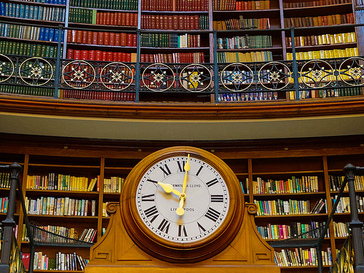 Picton Reading Room, Liverpool (Bev Goodwin CC BY 2.0) Picton Reading Room, Liverpool (Bev Goodwin CC BY 2.0) As part of the Sustaining Time project, Alex Buchanan is organising a public event in Liverpool on the 30th of October that looks at Time in the Archives. What archive resources might be available to research historical understandings and approaches to time? There is a fascinating line-up of presentations including:
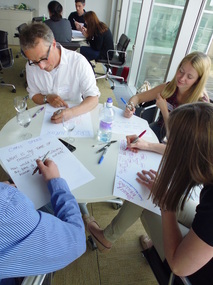 The write up from the recent Festival of Methods for Studying Perceptions of Time is now available on-line. Get an overview of what we got up to, listen to the presentations and have a look at the resources created on the day. Organised by Jen Southern as part of the Sustaining Time project. Speakers include: Rachel Thomson (Sussex), Martin Green (Lancaster), Alex Buchanan (Liverpool), Helen Holmes (Sheffield), Jennifer Whillans (Manchester), Eric Laurier (Edinburgh), James Ash (Northumbria), Jen Southern (Lancaster) and Chris Speed (Edinburgh). Sounding Drawing is one of the three projects that make up the Time of the Clock, Time of Encounter project and was led by Anne Douglas, Kathleen Coessens, Mark Hope and Chris Freemantle (On the Edge (OTE) Research, Woodend Barn Arts Centre, Orpheus Research Centre in Music (ORCiM), Champ’D’Action, and Ecoarts Scotland). It involved a practice-led experimentation in and improvisation around linking sound and image. In the second workshop participants were asked to create a 'score' for a drawing. The groups came together almost by chance or instinct and I found myself in a group with Fiona Hope and Isaac Barnes where we collaborated on 'sounding' Ann Eysermans P6. You can hear the results just below. |
Archives
November 2022
Categories
All
|
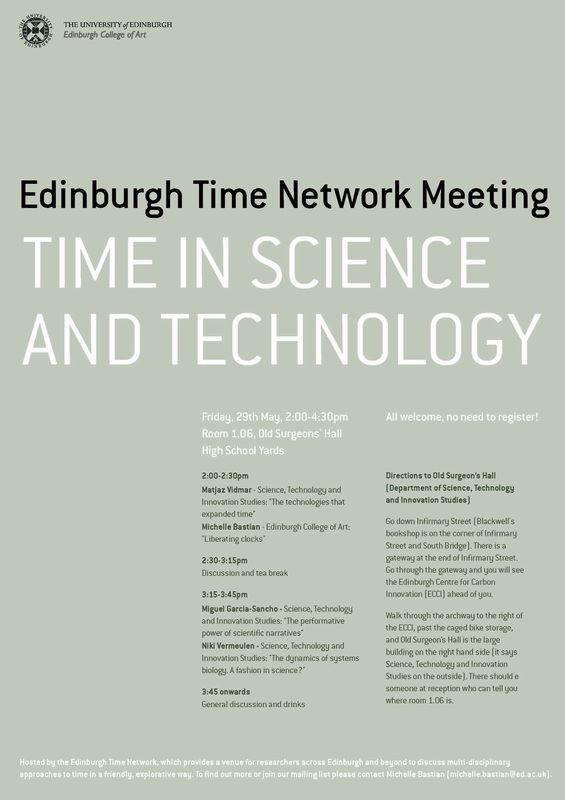
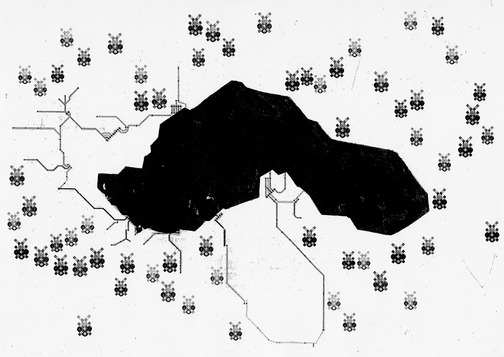
 RSS Feed
RSS Feed
